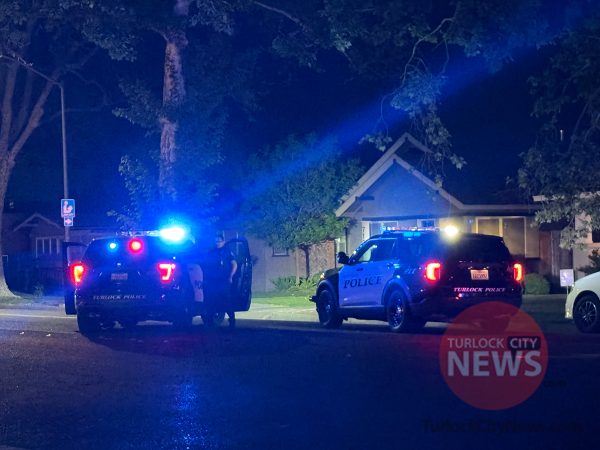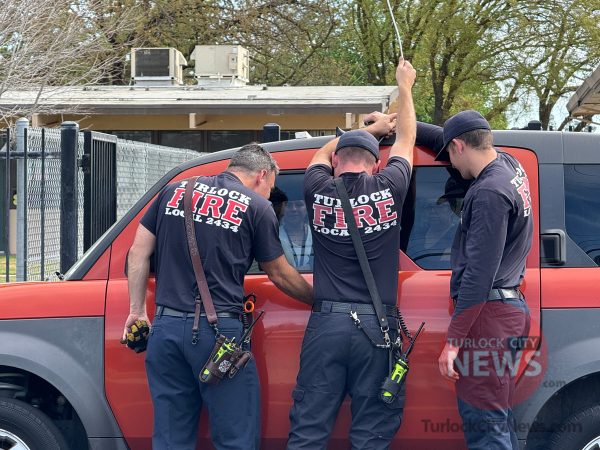Stanislaus County faces a “historic moment” and must act now to build “a better future,” County Supervisor Vito Chiesa said in his State of the County address Tuesday.
Chiesa, who represents Turlock and is now serving his first term as Chairman of the Board, departed from tradition, as the State of the County is traditionally a backward-looking speech. Instead, Chiesa laid out a long-term vision to guide the county out of an economic morass and into sustained success.
But making that change will require addressing three key issues, Chiesa said: Education, gangs, and jobs. Getting there won't be easy, he said, and will take the “time and vision” of the entire county.
“We all want the benefits of a safe, well-educated, economically thriving community,” Chiesa said. “But we are all going have to invest of ourselves if we want to make this happen. Whether it is working to improve your own neighborhood or stepping out with a more expansive vision, your individual effort will be needed to lift our community.”
Leaders must set an example for the county's youth, Chiesa said, by joining together to address these great problems of our time. Chiesa liked the effort to that of Stanislaus County residents of old who built roads, utilities, homes, and businesses to create a community out of nothing.
“I want our young people to see a generation that has risen up, and not given up, in the face of adversity.,” Chiesa said. “… I know things are difficult in our County, yet I am more steadfast than ever in seeing a future that will be better for our next generation and the generations to follow. I believe the tapestry of opportunity still exists today, even with the challenges we face.”
But those challenges are stern.
More than 35,000 county residents are jobless, equal to the labor force of Turlock and Patterson combined. Just to maintain the status quo, given population growth, 61,000 new jobs are needed in the next 25 years.
For perspective, Chiesa noted that the top ten manufacturing companies in Stanislaus combine to employ 14,000 people.
“Stated bluntly, the tens of thousands of jobs that are needed this very day in Stanislaus County are nowhere in sight and the additional tens of thousands of jobs needed for the future cannot currently be reached,” Chiesa said. “For a community that struggles with poverty, this is sobering. We know there is a jobs problem, but our strategies from the past are not working.”
And gangs are running rampant, causing problems for non-profits, businesses, and faith-based organizations alike, Chiesa said. Police alone are unlikely to be able to solve the problem, with more than 5,000 documented gang members in the county.
“Gangs are wreaking economic havoc on our communities and they are destroying the lives and futures of our young people,” Chiesa said.
Young people often turn to gangs because they lack education, Chiesa said. And even if undereducated young people don't take up a life of crime, they're ill-prepared to find a well-paying job.
“Our work force is some of the least prepared in the State of California and our County education rates are low, yet we complain that high-paying employers aren’t locating in Stanislaus County,” Chiesa said.
Hope may seem grim, Chiesa said. And he acknowledged that issues like education are outside of the traditional purview of county government.
But the time to act is now, Chiesa said.
“The issues are endemic, entrenched and seemingly endless” Chiesa said. “However, in order to break a cycle, sometimes there has to be a significant, life-altering event. I think our economic crisis could be our life-altering event.”
Chiesa called for the creation of public-private partnerships think-tanks, joining leaders of private industry in community-based teams with representatives from government, education, nonprofits, and the faith-based community. These multi-faceted groups would be best prepared to solve complex problems, Chiesa said.
“There are some who are going to resist this idea and say 'what does an entrepreneur know about gangs or dropout rates or long-term economic development strategy?'” Chiesa said. “And my response is they’re probably not experts in these areas. But, they are experts in problem solving, they are highly creative, strategic thinkers and they are experts in getting people to work together for common solutions. These leaders are exactly who we need for community-wide issues.”
The groups will develop goals and objectives, generate data, and regularly report progress to the community, Chiesa said. Any effort will look to work in partnership with those already working to solve the County's problems.
Tom Changnon, the Superintendent from the County Office of Education, is on board with the plan already, Chiesa said, as is California State University, Stanislaus President Joe Sheley.
Chiesa called for these groups to work on reducing drop-out rates and gang levels through thorough investigation and the development of alternatives.
A comprehensive jobs plan, is also needed, Chiesa said. Dr. Jeff Michael, of University of the Pacific’s Eberhardt School of Business and Dr. Gokce Soydemir, professor of Business Economics at CSU, Stanislaus will assist in developing jobs projection models, while entrepreneur Jeff Burda has agreed to be the founding leader of the so-called employment expansion initiative.
“While none of us knows what the plan will hold, I can guarantee we will need to work tirelessly whether it’s becoming a recognized agricultural entrepreneurial hub or export center of excellence, a Latino business corridor, or whether we are known as a comprehensive health services training region,” Chiesa said.
Cheisa also spoke on addressing problems within county government, from replenishing financial reserves to facilities planning and fixing the so-called “negative bailout,” which sees Stanislaus County receive less than its fair share of taxes from the state. Chiesa voiced support for a countywide transportation tax, which would open up millions in state transportation funds to the county, as well as expanded Amtrak and ACE train service.
Chiesa also asked for an annual countywide crime report that would be made available to the public, a revised water policy, a long term development strategy for the former Crows Landing Naval Air Station, and urged the county to build on a strong agricultural economy.
Many challenges remain, Chiesa said. And Chiesa admitted that some of his ideas may fail.
But taking the risk to bravely address the county's problems, rather than give up because problems seem too big, is the only path to ensure the future of Stanislaus County, Chiesa said.
“We will celebrate those things that make our community great, and we will not stand down in facing those things that hold us back,” Chiesa said. “Future generations will see we did not succumb to circumstance; but, like the generations that have gone before us, they will see us embrace the tapestry of opportunity we call the present, in order to create a more brilliant future for the generations come.”







